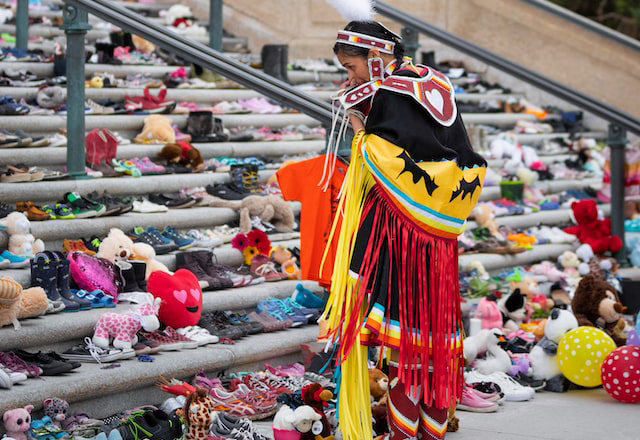
Canada has agreed to pay out C$2.8 billion ($2.09 billion) to settle a decade-long lawsuit seeking reparations for the loss of language and Indigenous culture caused by the residential school system.
The class-action lawsuit, first presented by 325 First Nations in 2012, expressed that mandatory residential schools tirelessly eroded Indigenous culture and imposed bans on Native languages.
Over 150,000 Indigenous students educated at approximately 130 residential schools across Canada from the 19th century until the 1990s were forbidden—often violently—from speaking their ancestral tongues or practicing any kind of traditions.
During court proceedings, survivors painfully testified about deaths of their classmates at the schools, abuse suffered, and poorly built, unsanitary facilities. In many cases, children were removed from their families by force and sent to the schools, often run by churches.
In 2021, radar technology produced horrifying evidence of unmarked graves containing the remains of 215 students on the grounds of the former Kamloops Indian Residential School in British Columbia. Thousands of students are believed to have died at the schools from neglectful conditions leading to disease, malnutrition, accidents, fires, and violence.
At a recent event, Shane Gottfriedson, the former chief of the Tk’emlúps te Secwépemc First Nation and British Columbia regional chief for the Assembly of First Nations, said that it had “always been a fight with government” to fairly settle Native Canadian human rights and claims to Indigenous land. Also speaking at the event, Marc Miller, minister of Crown–Indigenous relations, said the recent settlement would not “erase or make up for the past” but “what it can do is address the collective harm caused by Canada’s past.”
A 2015 report by the landmark Truth and Reconciliation Commission (TRC) concluded Canada’s residential school system
amounted to “cultural genocide.”
Rosanne Casimir, current Kúkpi7, or chief, of the Tk’emlúps te Secwépemc First Nation, said in a statement, “Canada spent over 100 years trying to destroy our languages and cultures through residential schools. It is going to take incredible efforts by our nations to restore our languages and culture—this settlement gives nations the resources and tools needed to make a good start.”
Under the new settlement, the Canadian government will place the compensation amount into a not-for-profit trust for Indigenous communities to fund education, culture, and language programs. In a statement, the government said the funds will also be used to design projects dedicated to “healing, wellness, education, heritage, language, and commemoration activities” for former students, to help them in “reconnecting with their heritage.” The full agreement is expected to be released after a hearing in late February.
Athina Kontos





